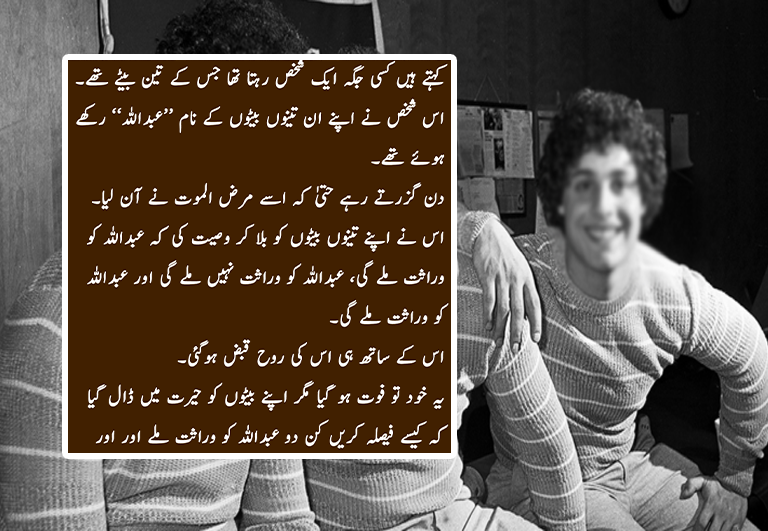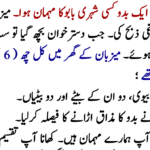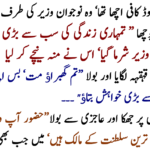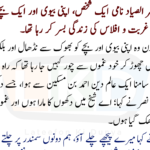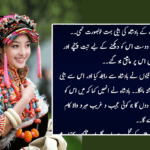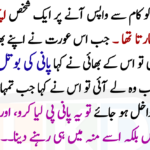Once upon a time, there lived a man who had three sons. Remarkably, all three of his sons were named Abdullah. As time passed, the man fell gravely ill and, sensing his end was near, he summoned his three sons to his bedside. He told them, “Abdullah will inherit my estate, Abdullah will not inherit anything, and Abdullah will inherit my estate.” With this, he took his last breath, leaving his sons bewildered about which two Abdullahs should inherit and which one should not.
Confused and seeking clarity, the three brothers decided to travel to the city to consult a judge. On their way, they encountered a man frantically searching for something. Upon inquiring, the man revealed that he was looking for his lost camel.


One Abdullah asked, “Was your camel blind in one eye?” The man replied, “Yes, indeed it was.”
Another Abdullah asked, “Was your camel lame in one leg?” The man quickly answered, “Absolutely, my camel was lame in one leg.”
The third Abdullah asked, “Was your camel’s tail cut off?” The man joyfully exclaimed, “Yes, my camel’s tail was indeed cut off. Please tell me where my camel is!”
The three brothers replied in unison, “By God, we have not seen your camel.”
Enraged, the man dragged the three brothers to the judge, convinced they had stolen and eaten his camel. When they arrived, the judge listened to the man’s complaint and then turned to the brothers, stating, “Given your detailed description, it seems you must have seen the camel. It’s best if you confess.”
The first Abdullah said, “Your Honor, we didn’t see the camel, but we did notice some signs. I observed that one side of the grass along the path was grazed while the other side remained untouched, indicating the camel was blind in one eye.”
The second Abdullah added, “I noticed that three footprints were deep while the fourth was light, suggesting the camel was lame.”
The third Abdullah explained, “I saw that the camel’s droppings were in a straight line rather than scattered, indicating its tail was cut off.”
The judge, satisfied with their explanation, told the man he could leave as the brothers did not have his camel.
Relieved of the accusation, the three brothers then shared their own dilemma with the judge. Surprised by their story, the judge invited them to stay overnight in the guest house, promising to find a solution the next day.
While staying in the guest house, they noticed they were being watched. Later, they were served a meal of cooked meat and bread. The first Abdullah remarked, “This meat is from a dog.”
The second Abdullah commented, “The woman who made this bread is heavily pregnant.”
The third Abdullah said, “This judge is not of noble birth.”
The next day, the judge summoned them and asked who claimed the meat was dog’s. The first Abdullah admitted it and explained, “I noticed that unlike cow, goat, or camel meat, this meat had a lot of fat with little flesh.”
The judge called the cook, who confessed that he had indeed cooked dog meat as a prank. The judge declared, “You, Abdullah, shall inherit from your father’s estate.”
Turning to the second Abdullah, the judge asked about the bread. The second Abdullah explained, “The bread was unevenly baked—well-cooked on one side and raw on the other—indicating the woman was too uncomfortable to bend properly.”
The judge confirmed this and said, “You too, Abdullah, shall inherit from your father’s estate.”
Finally, the judge asked the third Abdullah why he said the judge was not of noble birth. The third Abdullah explained, “If you were of noble birth, you wouldn’t have had us watched, served us dog meat, or had a heavily pregnant woman bake bread for us.”
The judge, visibly moved, went to his mother and asked her the truth. She confirmed that he was not of noble birth. The judge returned and said to the third Abdullah, “You are the Abdullah who will not inherit your father’s estate because only someone not of noble birth could recognize another so accurately.”
Upon hearing this, the other two Abdullahs returned home and asked their mother about their brother’s origins. She revealed, “Your father found him abandoned at the mosque one morning and brought him home, naming him Abdullah and raising him as his own.”
And so, this is one of the many tales from Arab folklore, rich with wisdom and lessons. Translated from Arabic for your enjoyment.
